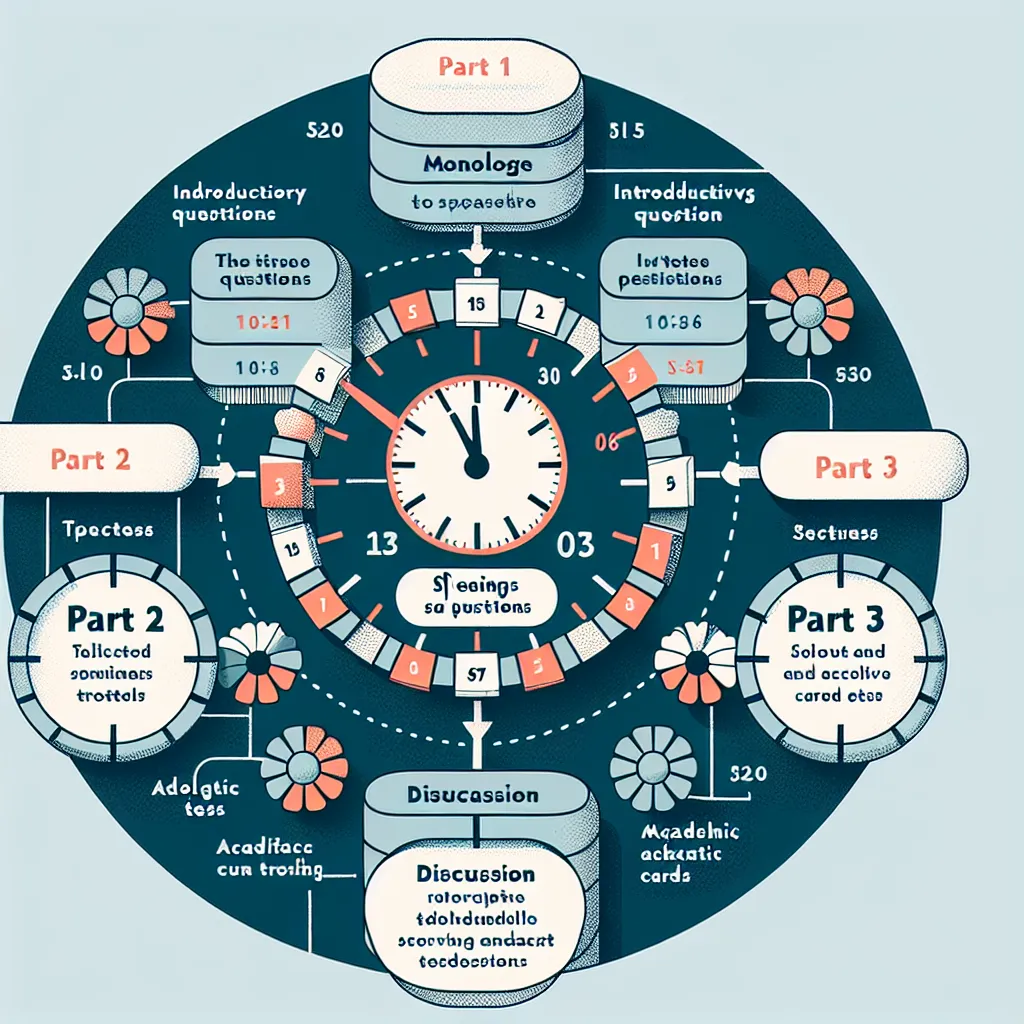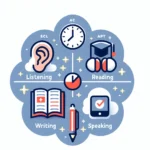Are you gearing up for the IELTS Speaking test but unsure how to practice effectively at home? You’re not alone. Many test-takers find the Speaking section particularly challenging, especially when preparing independently. This comprehensive guide will walk you through proven strategies and techniques to boost your confidence and improve your performance in the IELTS Speaking test, all from the comfort of your own home.
Understanding the IELTS Speaking Test Format
Before diving into preparation techniques, it’s crucial to understand the structure of the IELTS Speaking test. The test is divided into three parts:
- Part 1: Introduction and Interview (4-5 minutes)
- Part 2: Individual Long Turn (3-4 minutes)
- Part 3: Two-way Discussion (4-5 minutes)
Familiarizing yourself with this format is the first step in effective preparation.
 IELTS Speaking Test Format
IELTS Speaking Test Format
Essential Strategies for Home Preparation
1. Create an English-Speaking Environment
One of the most effective ways to prepare for the IELTS Speaking test at home is to immerse yourself in an English-speaking environment. Here’s how:
- Set your devices to English: Change the language settings on your phone, computer, and other devices to English.
- Watch English content: Regularly watch English movies, TV shows, and YouTube videos without subtitles.
- Listen to English podcasts: Subscribe to English-language podcasts on topics that interest you.
By surrounding yourself with English, you’ll improve your listening skills and become more comfortable thinking and expressing yourself in English.
2. Practice Speaking Daily
Consistency is key when preparing for the IELTS Speaking test. Set aside at least 30 minutes each day for focused speaking practice. Here are some effective exercises:
- Record yourself: Speak on various topics for 1-2 minutes and record yourself. Listen back to identify areas for improvement.
- Use IELTS speaking apps: Download apps like IELTS Speaking Practice or IELTS Prep App for structured practice sessions.
- Talk to yourself: Narrate your daily activities in English or describe objects around your house.
Remember, the more you practice, the more natural and fluent your English speaking will become.
3. Expand Your Vocabulary
A rich vocabulary is essential for expressing yourself effectively in the IELTS Speaking test. Try these methods to enhance your lexical resource:
- Learn a new word daily: Use apps like Vocabulary.com or Magoosh Vocabulary Builder to learn and practice new words.
- Create word groups: Organize words by themes (e.g., environment, technology, education) to make them easier to remember and use.
- Use new words in context: Practice incorporating newly learned words into your daily speaking exercises.
4. Improve Your Pronunciation
Clear pronunciation is crucial for scoring well in the IELTS Speaking test. Here’s how you can work on it at home:
- Use pronunciation apps: Apps like ELSA Speak or Google’s Pronunciation Practice can help you perfect your pronunciation.
- Practice tongue twisters: This fun exercise can improve your articulation and fluency.
- Shadow native speakers: Listen to native English speakers and try to mimic their pronunciation and intonation.
 Pronunciation Practice
Pronunciation Practice
5. Familiarize Yourself with Common Topics
The IELTS Speaking test often covers familiar topics. Prepare by researching and practicing responses to questions about:
- Your hometown
- Your work or studies
- Your hobbies and interests
- Your family and friends
- Your future plans
Create mind maps or bullet points for each topic to organize your thoughts and practice speaking about them regularly.
6. Master the Art of Paraphrasing
Paraphrasing is a valuable skill in the IELTS Speaking test. It allows you to express ideas in different ways and demonstrates your language flexibility. Practice paraphrasing by:
- Rewording news articles or short stories in your own words
- Explaining complex concepts using simpler language
- Using synonyms and alternative phrases to express the same idea
7. Time Your Responses
In Part 2 of the Speaking test, you’ll need to speak for 1-2 minutes on a given topic. Practice timing yourself:
- Use a stopwatch to ensure you can speak for the required duration
- Practice elaborating on topics to fill the time without unnecessary repetition
- Learn to pace yourself, speaking neither too quickly nor too slowly
Simulating Test Conditions at Home
To truly prepare for the IELTS Speaking test, try to recreate test conditions at home:
- Find a quiet space where you won’t be interrupted
- Set up a timer to mimic the test’s time constraints
- Practice with a friend or family member acting as the examiner
- Record your practice sessions to review later
By simulating test conditions, you’ll feel more comfortable and confident on the actual test day.
Common Mistakes to Avoid
Be aware of these common pitfalls when preparing for the IELTS Speaking test:
- Over-rehearsing memorized answers: This can make your responses sound unnatural
- Speaking too fast: Slow down and focus on clear articulation
- Using overly complex vocabulary incorrectly: It’s better to use simpler words correctly
- Giving short, undeveloped answers: Always aim to elaborate and provide examples
Next Steps in Your Preparation
Now that you have a comprehensive plan for preparing at home, consider these next steps:
- Take online mock tests to assess your progress
- Join online IELTS speaking groups or forums to practice with peers
- Consider online tutoring sessions for personalized feedback
- Review official IELTS speaking test samples to understand the expected standard
Remember, consistent practice and a positive attitude are key to success in the IELTS Speaking test. With dedication and the right preparation techniques, you can significantly improve your speaking skills and achieve your desired score.
By following this guide and dedicating time to regular practice, you’ll be well-equipped to face the IELTS Speaking test with confidence. Remember, the key to success lies in consistent effort and smart preparation strategies. Good luck with your IELTS journey!


